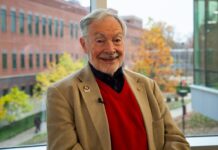
LOUISVILLE, Ky. – Kathleen Prezocki finally had enough.
Her essential tremor had progressed to the point that writing was nearly impossible, she always ordered sandwiches instead of soup or salad when eating out, and she was forced to use a card-holder so she could continue to play bridge.
“It was affecting me in eating, in writing and in speech. The medicine was not allowing me to control the symptoms anymore,” Prezocki said. “Trying to put a necklace on and trying to get that hook in there – my goodness that was frustrating!”
Prezocki’s UofL physicians suggested deep brain stimulation (DBS) therapy, in which surgeons implant in the brain a wire lead that is attached to a battery controller, similar to a pacemaker used for the heart. The lead provides electrical stimulation to a precise point in the brain to mitigate the tremor. DBS has been in use for nearly 20 years, but a new device allows more precise control over the stimulation, avoiding side effects, and is controlled with an iPod touch, a more intuitive control device than previous DBS technology.
The St. Jude Medical Infinity™ DBS system was recently approved by the U.S. Food and Drug Administration (FDA) for patients with Parkinson’s disease and essential tremor. The St. Jude system is the first in the United States to feature a directional lead designed to precisely customize therapy to help maximize patient outcomes and reduce side effects. The more precise control of the direction of the electrical stimulation allows for reduced strain on the battery, leading to longer battery life. In addition, the iPod Touch controller is more intuitive and familiar for patients.
When Prezocki learned of this improved DBS device, she decided it was time to take the next step, and was the first patient in the region to receive the St. Jude device. Joseph Neimat, M.D., a neurosurgeon with UofL Physicians, recently provided the implant for Prezocki at Jewish Hospital, part of KentuckyOne Health, to control tremor in her right hand. Neimat, also chair of the UofL Department of Neurological Surgery, has implanted several hundred DBS devices.
“This therapy can make a dramatic difference in a patient’s quality of life, particularly if they like to write, to play piano, to eat soup,” Neimat said. “And even though it is brain surgery, it’s a relatively low-risk surgery.”
Neurologist Victoria Holiday, M.D., clinical director of the Deep Brain Stimulation Program at UofL Physicians, has monitored Prezocki’s condition for several years and programmed her Infinity system to provide the proper stimulation. Holiday said the ability to more precisely control the stimulation allows doctors to achieve stimulation in the desired location while avoiding side effects.
“Think about a wire inside the brain and electricity is surrounding that wire in a ball shape. With this device, we can cut that ball into pie pieces. It allows us to steer away from areas of the brain that may be causing trouble,” said Holiday, also an assistant professor in the UofL Department of Neurology.
Since activating the device, Prezocki has been able to stop taking tremor medications. Her ability to write is improved and she is able to play bridge without a card-holder.
“I can write again!” Prezocki said.
“Her handwriting is much better than expected. Ms. Prezocki was not able to write at all prior to surgery and is now scrutinizing how her Zs look,” Holiday said. “She is successfully using the patient programmer at home and seems very pleased with how the system works.”
###
























